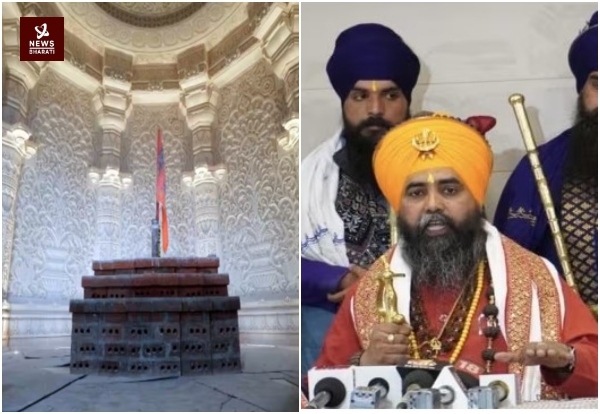Ram Mandir inauguration: Descendant of Nihang who barged Babri Masjid in 1858, to organise langar in Ayodhya on Jan 22
Total Views |
New Delhi, Dec 19: Jathedar Baba Harjit Singh, the descendant of Nihang Baba Fakir Singh Khalsa, who had barged into the disputed structure in Ayodhya, has received permission to organise Langar there during the Prana Pratishtha (consecration) of Bhagwan Shri Ram on January 22 in the long family tradition of devotion to the Hindu deity.

Notably, Nihang Baba Fakir Singh Khalsa had barged into the disputed structure along with 25 Nihang Sikhs in November 1858. The Nihang Sikhs had written ‘Ram’ on the walls of the Mughal mosque built over Bhagwan Ram’s birthplace, and hoisted a saffron flag. A case was registered against the 25 Nihang Sikhs at the Awadh Police Station on 30th November 1858 on the complaint of the muezzin of the officer of the Masjid. In the Supreme Court’s judgment favouring Hindus in the Ram Janmbhoomi case, the event of 1858 was cited.

Speaking to ANI, Baba Harjit Singh said, “We are part of Sanatan. This is our Dharma. We have worked to keep it alive.” He requested Hindus and Sikhs to celebrate the consecration of the Ram Mandir for Ram Lalla together on 22nd January 2024.
Baba Harjit Singh said he wanted to carry forward his ancestor’s devotion towards Bhagwan Ram by holding the langar along with other Nihangs, a distinct sect among the Sikhs identified by their loose, dark blue apparel and their plumed turbans. “Now, when the Prana Pratishtha (consecration) of Lord Rama is being done on January 22, 2024, how can I lag behind?” he asked while addressing the media in Chandigarh Sunday.
Babri पर 1858 में Nihang सिखों ने किया था कब्जा, अब उनके वंशज Ayodhya के Ram Mandir में चलाएंगे लंगर#Babri #Nihang #RamMandir pic.twitter.com/PDjAyGmRLs
— Dainik Jagran (@JagranNews) December 18, 2023
The Nihang Sikh, who claims to have equal faith in Sanatan Dharma and Sikhism, said: “Fundamentalists who try to divide Sikhs and Hindus should know the first FIR for wresting back Ram temple was not against a Hindu but a Sikh group. An apolitical bearer of eternal traditions, I took criticism for maintaining the link between Nihangs and Sanatan Dharma. I am an Amritdhari (baptised Sikh) who also wears a garland of rudraksha.”
Baba Harjit Singh said the Langar Sewa would start on 10th January 2024, and they would try to continue it till the end of February 2024.
Nihangs entering Babri Masjid
Notably, Nihang Baba Fakir Singh Khalsa had barged into the disputed structure along with 25 Nihang Sikhs in November 1858. The Nihang Sikhs had written ‘Ram’ on the walls of the Mughal mosque built over Bhagwan Ram’s birthplace, and hoisted a saffron flag. A case was registered against the 25 Nihang Sikhs at the Awadh Police Station on 30th November 1858 on the complaint of the muezzin of the officer of the Masjid. In the Supreme Court’s judgment favouring Hindus in the Ram Janmbhoomi case, the event of 1858 was cited.

